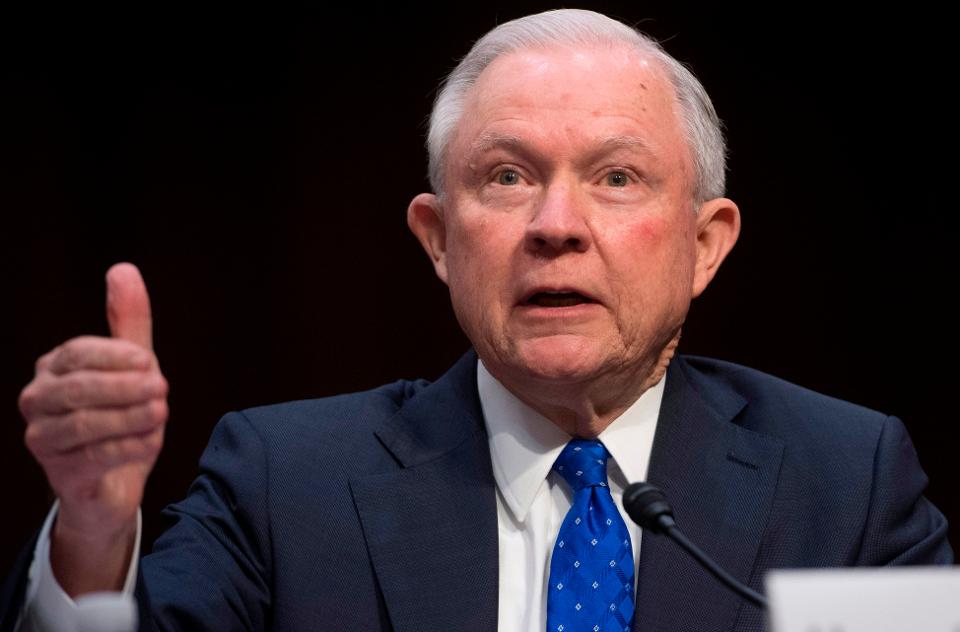Take this wet willie and stick it in your ear, Jefferson.
Where is the Landmark Lawsuit for Cannabis?
Retired NFL star Marvin Washington wants to start up a program to help injured athletes use cannabis, but he is barred from seeking federal money.
Dean Bortell wants desperately to help his epileptic daughter, Alexis, live a normal life.
Army veteran Jose Belen only wants to get some sleep.
Each one, and thousands like them, is a criminal under a federal law that prohibits the use of
marijuana in any quantity, for any reason.
The three are among the five plaintiffs in a lawsuit filed July 24 in the U.S. District Court for the Southern District of New York demanding it overturn a Vietnam-era law, the Controlled Substances Act (CSA). This drug policy gives the federal government the authority to outlaw marijuana on the grounds that it is classified as a highly addictive Schedule I drug with no medical value — and more dangerous than opioids.
Plaintiffs to the 89-page suit — which names Attorney General Jefferson Beauregard Sessions, DEA Acting Director Charles Rosenberg, and the United States of America — claim CSA, a cornerstone of Nixon’s war on drugs, effectively weaponized marijuana by using it to arrest and imprison tens of thousands of young black men, the poor, and anti-war activists.
Washington v Sessions claims the government has known all along that cannabis has medicinal value, and notes the government has grown its own crop for medical research since 1968. The plaintiffs say federal law “wrongfully and unconstitutionally criminalized the cultivation, distribution, sale, and possession.” These prohibitions, along with a system that ranks marijuana as dangerous as heroin, are “irrational” and violate the portions of the First, Fifth and 10th amendments to the U.S. Constitution.
If the courts or Congress decide marijuana should be descheduled, and no further restrictions are enacted, it would no longer be illegal at the federal level. That means the states would be allowed to regulate marijuana much as they do liquor.
Twenty years after California legalized medical marijuana, why haven’t the courts given states jurisdiction over cannabis?
Landmark Lawsuits
Many American civil rights were won in the Supreme Court by thick-skinned plaintiffs embodying the zeitgeist of their times:
Brown v Board of Education desegregated public schools.
Roe v Wade established a woman’s right to abortion.
Obergefell v. Hodges affirmed marriage equality. These cases have been so important – and so well known – they are usually referred to by just the plaintiffs’ names.
Will
Washington be marijuana’s
Brown?
Unlikely. Depending on who’s doing the handicapping, the suit is either too ambitious, not sufficiently focused, a victim of Trump-era hysterics, or just ahead of its time.
“A lawsuit has to be focused to get to the Supreme Court, they like to take an issue in little pieces,” said Georgetown University law center professor Randy Barnett, who in 2005 argued unsuccessfully before the Court against CSA’s dominion over marijuana
. Gonzales v Raich could have overturned federal control of marijuana — a landmark case for sure, even though it was decided against the cannabis industry.
“The
Washington suit feels more aspirational and activist, rather than a lawsuit that will affect a national prohibition,” said Brian Vicente, one of the nation’s top marijuana lawyers. “But you couldn’t find better plaintiffs. Who doesn’t love football, veterans, and children?”
Generally, there are two legal strategies to establish — or overturn — Constitutional law: States-up or SCOTUS-down.
For example, abortion advocates chose the SCOTUS-down strategy in 1970, when “Jane Roe” sued the state of Texas seeking an abortion from a proper doctor because she wanted the procedure, not because her own health was endangered. Only four states permitted abortion on demand at the time, and 30 outlawed abortion under any circumstance. The issue sparked demonstrations on campus and whispered queries over coffee, but broadcast television steered a wide path around the abortion question. Unlike today, celebrities didn’t discuss their intimate experiences, and there were no Oprah-like panel discussions to give women a broader perspective.
Lawyers guided Roe through the appellate system up to the Berger Supreme Court, which in 1973 ruled 7-2 that a woman’s right to privacy outweighs state concerns. Justice Harry Blackmun’s majority opinion divided pregnancy into trimesters, allowing states to determine how to implement those phases. Many interpreted the law very narrowly.
For gay marriage, it was more a question of when the Supreme Court would get involved, rather than what it would decide.
Thirty-six states had issued marriage licenses to same-sex couples by 2015, when the Roberts court ruled 5-4 that the equal protection clause of the 14th Amendment must allow homosexual couples the same rights as heterosexuals.
Constitutional lawyers will tell you that finding the right plaintiff will add credibility, compassion, and a moral imperative to making laws. The same is often true for causes.
Strategists note medical marijuana is more palatable to most Americans than recreational, and has already become the leading edge of legalization. One of the most compelling arguments for legalization, said Kate Bell, Legislative Council for the Marijuana Policy Project, is its value in treating PTSD, opioid addiction, anorexia, and the ravaging side-effects of chemotherapy.
But there is no simple solution. Marijuana legalization cuts across disciplines and specialties, creating some of the country’s most complex and emotional issues. Cannabis proponents and foes agree that the law will have to catch up — quickly — to address contentious areas as workplace testing, veterans’ health, taxation, trafficking, banking, religious exemptions, and of course, deciding which maladies qualify for cannabis. Any of these issues could enable facts on the ground to make the laws of the land.
The 10th Amendment
A recent Quinnipiac University poll found more than 90 percent of Americans support the use of medical marijuana, and just over half approve of recreational use. More importantly, 75 percent of Americans say the states should regulate marijuana.
So why does the federal government control cannabis, anyway?
The 10th Amendment to the Constitution gives all rights to the states or to the people, except for those reserved explicitly for the government. Notably making war, levying taxes, conducting foreign affairs and regulating interstate commerce.
The government has been applying
the commerce clause to nearly anything that can be mailed, sold or schlepped across state lines since the early 1800s, including medical marijuana.
In
Raich, SCOTUS upheld the government’s position that even a small grower, operating lawfully under a state statute, can still be prosecuted by the federal government — even if the drug is not sold and does not leave the state. The rationale: Even legal marijuana is easily transported across state lines, and its availability affects the illicit market.
“The law makes no sense,” said Barnett.
Vicente, who believes marijuana will be fully legal in five years, agrees. “The Court finally picked up a marijuana case, and they blew it,” he said.
“The traditional interpretation of the commerce clause hasn’t been successfully challenged,” said Bell. “Until that barrier is broken it would be hard to take a suit forward.”
In Danger Every Minute
Advocates agree the trickle-up strategy is the most effective, but they aren’t fixed on the courts.
“The best strategy is whatever finally breaks federal prohibition,” said Political Director Justin Strekal of NORML, which has traditionally concentrated efforts at the state level. Today, a patchwork of advocacy organizations work a combination of voter initiatives, state legislatures, lawmakers, congressional committees, and the courts in a mostly united effort to overturn federal marijuana prohibition, or cede authority to the states.
In fact, Vicente said many lawmakers have a responsibility to extract marijuana from federal control: Every state that has adopted marijuana laws so far has done so through popular referendum, giving representatives and state houses a mandate to pass cannabis-friendly laws.
Congress has temporarily crippled the government’s ability to enforce federal marijuana laws with the
Rohrabacher-Farr Amendment, now Rohrabacher-Blumenauer. The language has, since 2015, prohibited the Justice Department from using federal funds to interfere with state medical marijuana programs. The amendment, which must be renewed every year, is particularly vulnerable in a conservative-controlled Congress. How vulnerable? Earlier this month the Senate refused to hold a floor vote on a spending bill that included the measure, meaning it could have been overturned by simple inaction. However, a deal between President Trump and the Democratic leadership pushed consideration of that bill to Dec. 15, giving pro-marijuana lawmakers three months to build support.
An unrelated marijuana protection, the
Cole Memorandum, was issued by the Obama Justice Department and prohibits the federal government from legally obstructing state policy when there exists “strong and effective” regulations. However, the Justice Department can rewrite or rescind the order at any time — and that time may be now.
Cole has “been perceived in some places almost as if it creates a safe harbor, but it doesn’t,” Deputy Attorney General Rod Rosenstein told the conservative Heritage Foundation on Sept. 14. “That is, even if, under the terms of the memo you’re not likely to be prosecuted, it doesn’t mean that what you’re doing is legal or that it’s approved by the federal government or that you are protected from prosecution in the future.”
These developments have put cannabis advocates even more on edge than usual.
“Until marijuana is descheduled, it is in danger every minute of the day,” Strekal warns.
Despite Trump’s offhand support for the medicinal value of cannabis, it does not appear the White House is reigning in Sessions, a famously zealous marijuana foe. The AG sent letters to lawmakers earlier this summer, telling them it would be “unwise” to restrict the Department’s ability to prosecute drug cases, particularly in the middle of a “drug epidemic.” That emergency is opioids, not marijuana.
In July, Sessions sent letters to the governors of recreational states questioning the effectiveness of their regulations to control the product. Those letters are widely viewed as a precursor to federal lawsuits that would shut down state programs and their law-abiding participants.
The states’ resistance to Sessions have been swift, detailed, and unyielding.
Legal states are bullish on the annual $50 billion “green rush” of jobs, taxes, tourism, and investments that could fill state coffers with more than $50 billion by 2026. California alone expects to add 30,000 new agricultural, retail, and ancillary jobs, according to New Frontier Data.
Cannabis’ Champions
In early July, Senator Cory Booker (D-NJ) introduced the
Marijuana Justice Act which would decriminalize marijuana, vacate low-level convictions, and provide training to a generation of young black offenders who have been disproportionately arrested and harshly sentenced during the War on Drugs. It also calls for withholding jail-related federal funds from states that continue to target disenfranchised users. The bill has the early approval of progressive lawmakers, but is unlikely to pass anytime soon.
Booker’s bill and Washington’s lawsuit — which were introduced less than two weeks apart — frame marijuana in a social justice context. But the Trump Administration views marijuana as a crime.
Among the entities supporting medical marijuana: The American Legion, Scott’s Miracle-Gro, Bernie Sanders, Oprah and, most intriguingly, internist David Shulkin.
Shulkin, the Secretary of Veterans’ Affairs (VA), reluctantly told reporters in July that medical marijuana might be beneficial for some VA patients, but federal law prohibits the agency from recommending it.
“If there is compelling evidence that this is helpful, I hope that Congress … and the people take a look at that and come up with the right decision.”
Kate Bell said the people already have.
“The most passionate support for legal marijuana has come from the voters themselves,” she said. “The changes we’re seeing are from voter initiatives. The people are lightyears ahead of the courts.”





